Grover, La Fayette (1874). Report of Governor Grover to General Schofield on the Modoc War : and reports of Major General John F. Miller and General John E. Ross, to the Governor : also letter of the governor to the Secretary of the Interior on the Wallowa Valley Indian question. Salem, OR: M.V. Brown, State Printer. Retrieved March 8, 2014.
Related Research Articles

Presidential elections were held in the United States on November 7, 1876. Republican Governor Rutherford B. Hayes of Ohio very narrowly defeated Democrat Governor Samuel J. Tilden of New York. Following President Ulysses S. Grant's decision to retire after his second term, U.S. Representative James G. Blaine emerged as frontrunner for the Republican nomination; however, Blaine was unable to win a majority at the 1876 Republican National Convention, which settled on Hayes as a compromise candidate. The 1876 Democratic National Convention nominated Tilden on the second ballot.
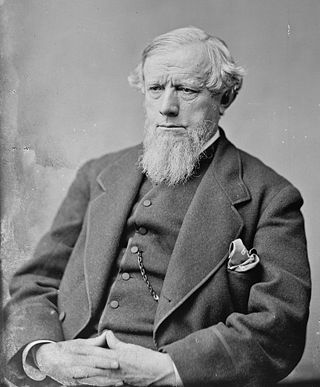
Allen Granberry Thurman, sometimes erroneously spelled Allan Granberry Thurman, was an American politician who served as a United States representative, Ohio Supreme Court justice, and United States senator. A Democrat, he unsuccessfully ran for vice president of the United States in 1888 as the running mate of President Grover Cleveland.

Lot Myrick Morrill was an American politician who served as the 28th governor of Maine, as a United States senator, and as U.S. secretary of the treasury under President Ulysses S. Grant. An advocate for hard currency rather than paper money, Morrill was popularly received as treasury secretary by the American press and Wall Street. He was known for financial and political integrity, and was said to be focused on serving the public good rather than party interests. Morrill was President Grant's fourth and last Secretary of the Treasury.
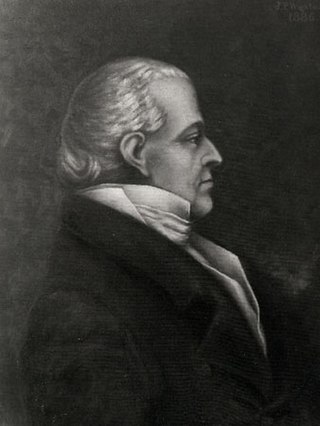
Robert Wright was an American politician and soldier who fought in the American Revolutionary War.
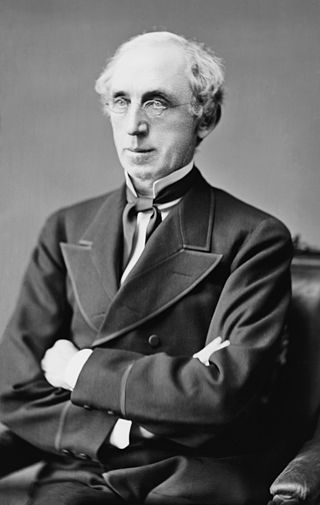
Henry B. Payne was an American politician from Ohio. Moving to Ohio from his native New York in 1833, he quickly established himself in law and business while becoming a local leader in Democratic politics. After serving in the Ohio Senate, Payne was elected to a single term in the United States House of Representatives in 1874. In the House, he worked unsuccessfully for a compromise in the debate over whether all of the nation's currency should be backed by gold. He was defeated for reelection, but served on the Electoral Commission that convened in early 1877 to resolve the dispute over the results of the 1876 presidential election.

Isham Green Harris was an American and Confederate politician who served as the 16th governor of Tennessee from 1857 to 1862, and as a U.S. senator from 1877 until his death. He was the state's first governor from West Tennessee. A pivotal figure in the state's history, Harris was considered by his contemporaries the person most responsible for leading Tennessee out of the Union and aligning it with the Confederacy during the Civil War.

The Electoral Commission, sometimes referred to as the Hayes-Tilden or Tilden-Hayes Electoral Commission, was a temporary body created by the United States Congress on January 29, 1877, to resolve the disputed United States presidential election of 1876. Democrat Samuel J. Tilden and Republican Rutherford B. Hayes were the main contenders in the election. Tilden won 184 undisputed electoral votes, one vote shy of the 185 needed to win, to Hayes' 165, with 20 electoral votes from four states unresolved. Both Tilden and Hayes electors submitted votes from these states, and each claimed victory.

Albert Smith White was an 18th Century American lawyer, politician, and jurist who served as a United States senator from Indiana, a United States representative from Indiana and a United States district judge of the United States District Court for the District of Indiana.

George Earle Chamberlain Sr. was an American attorney, politician, and public official in Oregon. A native of Mississippi and member of the Democratic Party, Chamberlain's political achievements included appointment followed by election as the first Attorney General of Oregon, a stint as the state's 11th Governor, and two terms in the United States Senate in Washington, DC.

Samuel Augustus Foot was the 28th Governor of Connecticut as well as a United States representative and Senator.
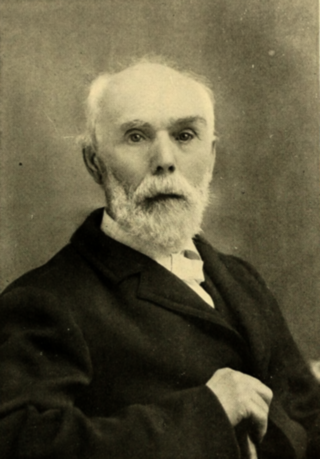
John Whiteaker was an American politician, soldier, and judge. A native of Indiana, he joined the army during the Mexican–American War and then prospected during the California Gold Rush. After moving to the Oregon Territory, he served as a judge and member of the legislature. A Democrat, Whiteaker served as the first state Governor of Oregon from 1859 until 1862 and later was Oregon's Congressman from 1879 to 1881. He also was president of the Oregon State Senate and Speaker of the Oregon House of Representatives.
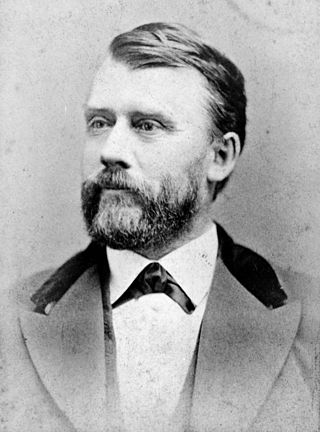
Stephen Fowler Chadwick was an American Democratic politician who served as the fifth Governor of Oregon from 1877 to 1878. Chadwick was the first person to obtain the governorship by way of the state's Line of Succession.

Walter Marcus Pierce was an American politician, a Democrat, who served as the 17th Governor of Oregon and a member of the United States House of Representatives from Oregon's 2nd congressional district. A native of Illinois, he served in the Oregon State Senate before the governorship, and again after leaving the U.S. House. Pierce was an anti-Catholic supporter of compulsory public education and signed a law banning parochial schools, resulting in lawsuits and the United States Supreme Court case of Pierce v. Society of Sisters. He was also a eugenicist and supported Prohibition. He advocated unsuccessfully for a state income tax and vehicle license fee.

John Hanna was a United States Representative and United States Attorney from Indiana.
William Smith was an eighteenth- and nineteenth-century congressman from Virginia.
John Test was a U.S. Representative from Indiana.
William Hunter was an American judge and politician. He served as a U.S. Representative from Vermont.

Rutherford Birchard Hayes was the 19th president of the United States, serving from 1877 to 1881. A staunch abolitionist from Ohio, he was also a brevet major general for the Union army during the American Civil War.

The 1876 United States elections were held on November 7. In one of the most disputed presidential elections in American history, Republican Governor Rutherford B. Hayes of Ohio ended up winning despite Democratic Governor Samuel J. Tilden of New York earning a majority of the popular vote. The Republicans maintained their Senate majority and cut into the Democratic majority in the House.

The 1876 United States presidential election in Oregon took place on November 7, 1876, as part of the 1876 United States presidential election. Voters chose three representatives, or electors to the Electoral College, who voted for president and vice president.
References
- ↑ "Biographical Sketch of La Fayette Grover". Crafting the Oregon Constitution. Oregon State Archives. Archived from the original on July 1, 2022. Retrieved February 6, 2023.
- ↑ "Oregon Governor Lafayette Grover". National Governors Association. Retrieved August 24, 2012.
- ↑ "Grover, La Fayette, (1823 - 1911)". Biographical Directory of the United States Congress. Retrieved August 25, 2012.
- ↑ "Man Who Nearly Defeated Hayes". The Spokesman-Review . Portland. May 12, 1911. p. 10. Retrieved March 31, 2022– via Newspapers.com.
External links
La Fayette Grover | |
|---|---|
 | |
| 4th Governor of Oregon | |
| In office September 14, 1870 –February 1, 1877 |

